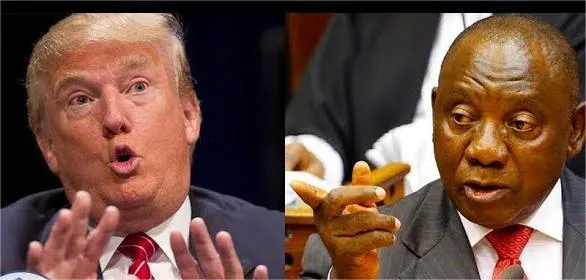Ramaphosa prepares for crucial talks with Trump amid Afrikaner 'refugees' saga

SA president Cyril Ramaphosa and his US counterpart Donald Trump are expected to discuss bilateral relations during their meeting this week.
Image: X
AFRIKANERS who migrate to America as refugees under the pretext of escaping genocide in South Africa are less important on the agenda, which President Cyril Ramaphosa prepared for his meeting with his US counterpart, Donald Trump, this week, although he expects this to be raised.
Ramaphosa was mostly prepared to engage Trump on economic and trade issues, but was aware that the issue of his government taking the Israeli administration to the International Court of Justice might come up strongly during the discussions at the White House.
Ramaphosa’s spokesperson, Vincent Magwenya, said the president did not see the Afrikaner "refugee" matter as important, as it “does not define US-South Africa relations.”
Ramaphosa and some ministers will visit Washington, DC from Monday to Thursday to meet his counterpart, who on February 10 signed an Executive Order, which was seen to be threatening to cut ties with South Africa.
This will be the first diplomatic face-to-face meeting since Trump was inaugurated in January.
Trump alleged that Ramaphosa’s government confiscates “disfavoured” citizens’ property without compensation, subjecting Afrikaners to genocide and discriminatory transformation policies.
More important issues
Magwenya said Ramaphosa would not apologise or back down on refuting the distortion of facts regarding the treatment of Afrikaners.
“The President will once again affirm the untruthful nature of so-called genocide claims. However, there are far more important issues that are central to the relationship between the two countries. For the president, this issue (of Afrikaners) is not a priority,” said Magwenya.
He said Ramaphosa had articulated the country’s position on the matter well enough and that his position “will remain as firm as we have communicated it in the past.”
“The President will not accept a distorted view about the state of his own country,” said Magwenya.
Trump also accused South Africa of taking a position against his country and its allies for taking legal action against Israel, but “not Hamas”, for committing genocide, and also strengthening ties with Iran, which he accused of supporting terrorism globally.
Magwenya admitted that the tension between the Israeli-Gaza issue “remains a very difficult issue between South Africa and the US”.
“We will correct the impression that we have a relationship with Hamas, we don't, [as] there's also no evidence to the contrary. The President strongly condemned the October 7 (2023) attacks by Hamas and called for the return of all hostages, a permanent ceasefire, and the resumption of peaceful negotiations,” he said.
Clarity sought on AGOA
He said the most important issue on Ramaphosa’s agenda was the trade relationship.
He said Ramaphosa would seek clarity on Trump's position on the African Growth and Opportunity Act (AGOA), which would expire in September and whose future under Trump was uncertain.
“From our side, the President would like to see both the extension of AGOA and South Africa's continued participation in the trade scheme, for the benefit of South Africa and that of the African continent.
“However, we are also ready to engage over a new, mutually beneficial trade framework that will be fair and prosperous for both countries,” said Magwenya.
Cosatu wants Ramaphosa to come back home with a bag full of investment and job opportunities agreements.
“We would encourage President Ramaphosa to assure President Trump that there is no white genocide, land grabs, or discrimination, but there is crime, unemployment, and that affects everyone, especially Black people,” said the federation’s parliament spokesperson, Matthew Parks.
He called on Ramaphosa to assure Trump that South Africa belonged to all who lived in it and that Afrikaners were an integral part of the country.
He said Trump should be told that crime in South Africa was affecting everyone irrespective of race.
“We would welcome US support for South African law enforcement to win the war against crime. We would welcome ways to increase trade and investment between both our countries in ways that create jobs for South African, African and American workers,” said Parks.
Protect sovereignty
The South African Communist Party had, on Workers' Day earlier this month, accused Trump’s administration of representing imperialism, which “dictates to us or undermines our hard-won democratic sovereignty”.
The party said on Friday that although the trip was not sanctioned by the tripartite alliance, Ramaphosa should protect South Africa’s sovereignty “without reservation, including the right to make its policy in line with its constitution and legal prescripts”.
“The South African delegation to Washington should emphasise the importance of the development of the global south as a shared objective among the people in this region of the world and as well as their right to self-determination. The South African government, therefore, cannot and would not act to promote the interests of forces whose interests are detrimental to the development and transformation of the country.
“The refugee programme of the US government induced by these forces is therefore based on a fallacy concocted by anti-transformation forces in South Africa intended finally to construct a racialised international solidarity for their benefit underpinned by white nationalism and white supremacy,” said SACP spokesperson Mbulelo Mandlana.
ANC secretary-general Fikile Mbalula said South Africa should never stop engaging with anyone who tampers with its sovereignty.
“In particular, the notion circulating in the USA - that there is genocide and the killing of a particular racial group in our country - is a complete distortion and must be dispelled. This meeting comes amidst a wave of negative and distorted developments that we have all read about. It is worrisome that the President of the USA seems to believe those distortions,” said Mbalula.
Related Topics: